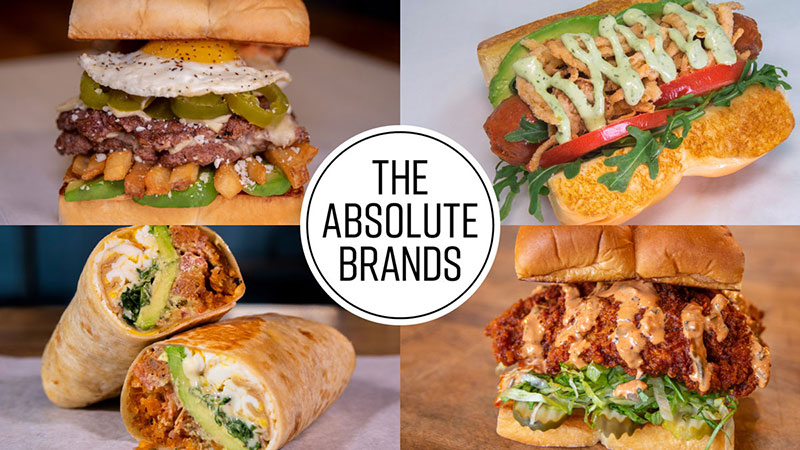Dog Haus, the 50-unit West Coast franchise known for gourmet hot dogs, burgers and fried chicken sandwiches, moved up a major virtual restaurant rollout to help keep sales flowing during the COVID-19 pandemic.
The California-based company announced the launch of Absolute Brands, its new restaurant group that will soon house eight virtual brands, built with star menu items found in Dog Haus as well as unique items that were featured in the brick-and-mortar locations as limited time offers (LTOs).
All eight concepts were initially set to roll out next year, but three were ready to go and already operating in the company’s three virtual kitchens.
“We’d been working on this for about seven months,” said founding partner André Verner. “We wanted to launch in virtual kitchens in August, then nationwide in 2021 in the first quarter. However, you’ve seen that box that says, ‘In case of emergency break glass?’ So, it was close enough where we could say let’s do it.”
The emergency, of course, was COVID-19, which hit the company especially hard. Of the 35 traditional locations, 20 are biergartens and social gathering spots. They saw as high as 35 percent of sales flow through the bar. The remaining 15 locations were non-traditional spots in stadiums or concert venues, they were all shuttered as concerts were canceled and sports seasons were postponed.
“We got hit pretty hard. The good news (is) we did have the virtual restaurants that are doing better than fine and we’d been in the delivery space already at all 35 locations,” said Verner. “I’m just glad we were one of the brands that were ahead of the game there, otherwise I don’t know how a brand would make it.”
He said one especially crucial benefit to having a strong delivery focus already was connections with the delivery platforms. Verner said the company point person on delivery already had contacts at the firms and they were able to clone the menu from the virtual restaurants, which were already operating and simply replicate them for the brick-and-mortar locations for company locations and franchisees alike. Restaurants without those connections had to line up in a long queue as scores of operators try to scramble around delivery.
There were two key aspects to building out the virtual brands: catering to the delivery favorites and optimizing concepts for the third-party platforms.
“Basically, we studied and had a lot of help from people to see what are the popular items being ordered in delivery. We went down the top 25 brands, when pizza and Chinese popped up, we skipped over those, they didn’t fit our DNA. But fried chicken, burgers, wings and plant-based foods and breakfast foods—these are things that people are passionate for and we already have ingredients for,” said Verner. “We created these different concepts, basically spinoffs of our current menu or LTOs that we served in the past year with celebrity chefs. And then we created concepts around them.”
The other core value of these virtual brands was optimizing the Dog Haus menu for third-party delivery platforms. Typically, users would get a splash image of a one of the company’s gourmet hot dogs. But if they were craving a chicken sandwich, they might scroll right past. And when they searched for “hot chicken,” Dog Haus wouldn’t show up due to the limited number of keywords allowed in a description.
But by making a virtual brand around the company’s chicken sandwich, scrollers and searchers would see Bad MuthaClucka with a tantalizing splash image of Dog Haus’ fiery red chicken sandwich under the new brand.
That’s the trick for all three initial brands: Bad MuthaClucka, Plant B, Bad-ass Breakfast Burritos. The three virtual kitchens also launched Frieburger, a high-quality burger concept to tap into the huge demand for burgers and fries on the delivery platforms. The company will announce the remaining four brands when they’re ready for prime time, but Verner said the concepts are focused on breakfast, salad, pastrami and quesadillas.
He said the opportunity to roll this out faster than planned “fell into our lap,” and while the business hit at the brick-and-mortar locations is awful, seizing the opportunity will help the company emerge stronger.
“It wasn’t our plan to launch it this fast or this way, but we’re entrepreneurs so we tried to find the opportunity in this crisis,” said Verner. “Were big enough at the corporate level to do this process. But were not so big where we need to go through the process with the boards and figure out how do we handle this. So, we’re in this sweet spot where we can be innovative and have that entrepreneurial spirit behind us pushing us.”
He said the company is also rolling out its proteins as a grocery add-on at brick-and mortar locations to keep money flowing. He said between the virtual kitchens and the grocery items some franchisees that had to lay people off actually brought them back to meet the delivery demand.


